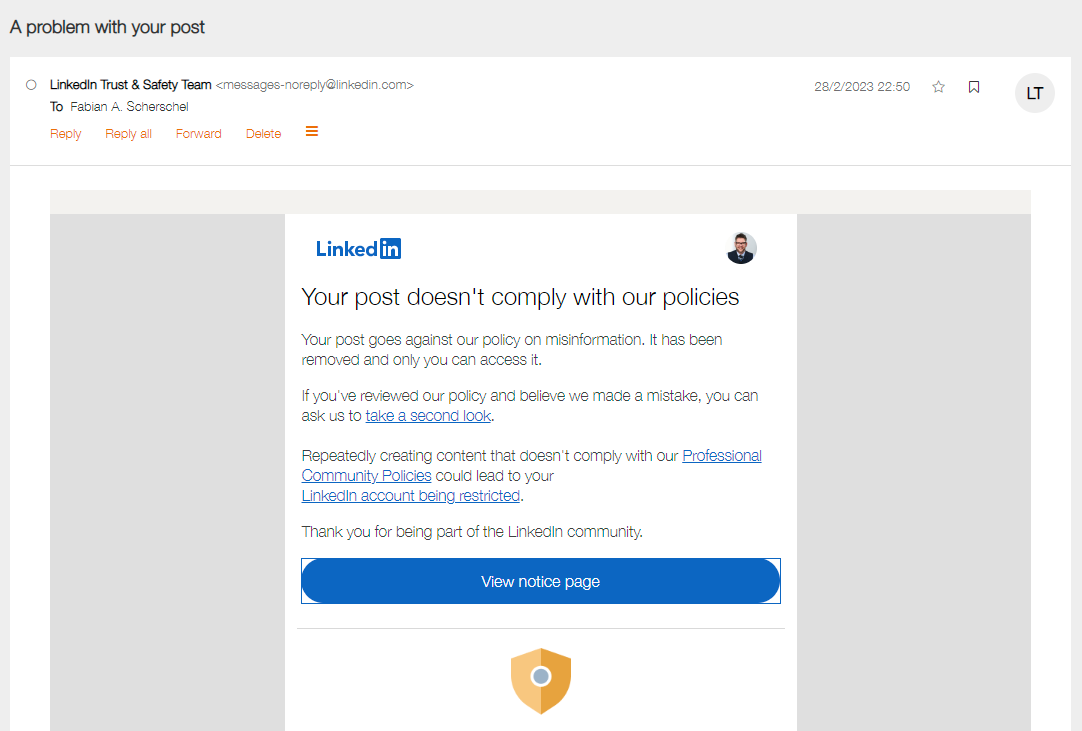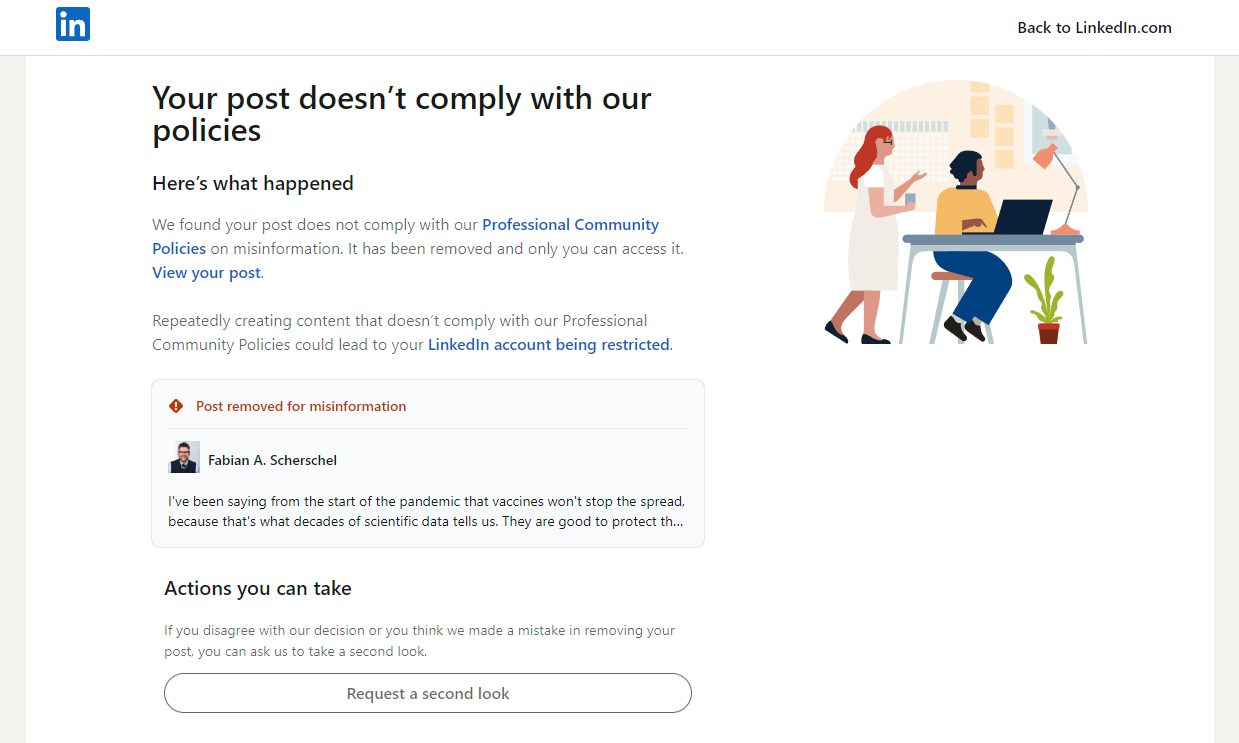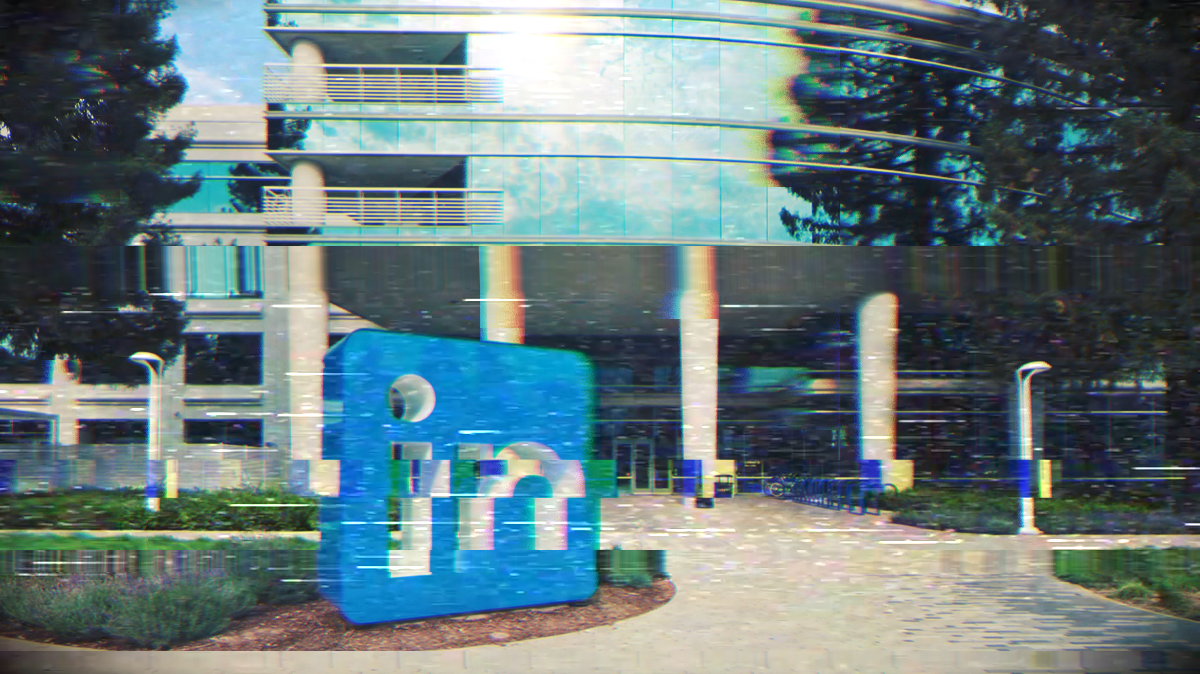Horribly broken content moderation practices at LinkedIn make the Microsoft-owned social network actively hostile to scientific progress and press freedom, it seems.
 This podcast episode was recorded with a live audience on my Twitch channel. Recordings of these streams get saved to a YouTube playlist so you can watch them on demand at your leisure.
This podcast episode was recorded with a live audience on my Twitch channel. Recordings of these streams get saved to a YouTube playlist so you can watch them on demand at your leisure.
LinkedIn’s Content Review Process Is a Joke
After releasing my previous podcast episode, I posted links to it on several social media platforms to inform people about it, as I usually do. One of these platforms was LinkedIn, the professional job-oriented social network belonging to Microsoft. Very soon after, I received an email telling me that my post “doesn’t comply with LinkedIn’s policies”. In fact, it was labelled as “misinformation”:


Assuming that some machine learning algorithm had run amok, I did what the notice suggested when faced with an obviously ridicolous claim like this and I “requested a second look”. I soon received a second notice that their verdict would stand.
Let’s examine what this means: LinkedIn thinks that a peer-reviewed, scientific paper, published by the former head of NIAID and the former chief medical advisor to the US President in Cell Host & Microbe is misinformation. This is ridicolously dumb. It’s idiotic.
Of course, having some shitty machine learning algorithm flag up stuff because it finds the right words but can’t understand what they mean is standard for pretty much any social network right now. I am also not surprised that the manual review – I presume that is what the “second look” was – failed, too, since that was probably undertaken by a badly underpaid and underqualified wretch in a miserable cubicle farm somewhere.
How Can Anyone Take LinkedIn Seriously Now?
But I must admit I was a bit surprised that this happened at LinkedIn. Because, you see, LinkedIn isn’t just any social network. It is a social network for professionals who share their work with their peer group. What happens if I am a cell biologist, working on mRNA vaccines, and I want to share this paper, which is very relevant, with the professionals in my field that I am connected with? How can anyone take a site seriously that brands itself as a professional network for professionals – and wants to get their money for subscriptions – but thinks that Dr Fauci is spreading misinformation in a Cell paper?
Granted, this might not have happened had I simply posted the paper, since that is probably whitelisted. But censoring a link to my podcast, which is a journalistic product, raises another, even more serious issue. A press freedom issue. What LinkedIn is doing here is suppression of a legitimate news story as misinformation – very much along the line of Twitter’s suppression of the Hunter Biden laptop story at the behest of the FBI.
This is not the first time this kind of thing happens to me, either. At least YouTube had the decency to admit they were wrong when they deleted one of my episodes for a similar reason.
You might be wondering what LinkedIn has to say about this damning situation. So do I, which is why I wrote their press office more than a week ago with a request to explain their actions in this case. They did not get back to me. Which is about what I expected, based on how abysmally Microsoft deals with press inquiries. As it stands, I can only assume they know they fucked up in my case and they also know that their process for dealing with things like this is horribly unsuited to the task but don’t have the balls to fess up to it or even try to rectify the situation. A damning self-indictment, if I ever seen one.
At this point I feel that no serious scientist, or journalist for that matter, can use LinkedIn with good conscience. Their terms of service seem to be actively hostile both to scientific work as well as to press freedom.
Producer Feedback
I value your input greatly. If you have any opinions or remarks on the things discussed in this, or previous episodes, or ideas for future ones, please contact me.
Due to a very heavy workload at the moment, I’m a bit behind with my email in places. Because of this, I will now belatedly address some feedback that Fadi Mansour sent me on episode 142 over a month ago:
I will start with the not so serious topic: you mentioned a lot of dancing at the wedding, I think you probably meant traditional dancing where they form a line? This is called “Dabke”. I was never a fan, but people are usually very enthusiastic about it. I hope you enjoyed it!
On a more serious note: In the episode you talked about the willingness of people in Dubai to give up freedoms in exchange for comfort/luxury. Here I would like to make a distinction between foreigners living or visiting there and the local population. Although having never been there, my points of view are coming from familiarity with the kind of governments in the area.
For local citizens, their freedoms are already limited, governments already encroach upon personal freedoms, so people have already given up on that, so what you see as concessions, are already part of the deal of living there, what is at stake is their life and freedom.
On the other hand, for foreigners from more democratic countries, this is different, as they would not be worried about their personal security. But the trouble, from my point of view, and I think you would agree here, is that giving up these freedoms now, although the effects are still not very apparent, is bringing these more democratic countries to the same level of balance of power as these less democratic ones: Governments and corporations have much more control over individuals, and this is what makes me worried!
Unfortunately, we are living in interesting times.
Credits
This podcast is provided free of charge and free of obligations under the value-for-value model. However, as a freelance journalist volunteering my time to produce this show, I need your support. If you like my work and want to make sure The Private Citizen keeps going, please consider joining my Patreon.
Showrunners
- Sir Galteran
Executive Producers
- Butterbeans
- Jaroslav Lichtblau
- Rizele
- Sandman616
Supervising Producers
1i11g, avis, Bennett Piater, Dave, ikn, Jackie Plage, Jonathan M. Hethey, krunkle, Michael Mullan-Jensen, Robert Forster, Tobias Weber
Producers
Andrew Davidson, astralc, Cam, Captain Egghead, David Potter, Dirk Dede, Fadi Mansour, Florian Pigorsch, Joe Poser, Michael Small, Mika, MrAmish, Rick Bragg, RJ Tracey
Associate Producers
Barry Williams, D, Jonathan, Juhan Sonin, Kai Siers, RikyM, Steve Hoos, Vlad
Thanks to Bytemark, who are providing the hosting and bandwidth for this episode’s audio file.
The show’s theme song is Acoustic Routes by Raúl Cabezalí, licensed via Jamendo Music. This episode’s ending song is Can’t See My Face (In the Crowd No More) by Big Girl, licensed via Epidemic Sound.
